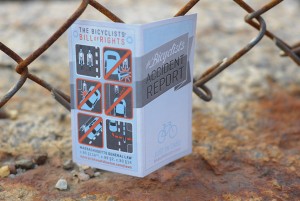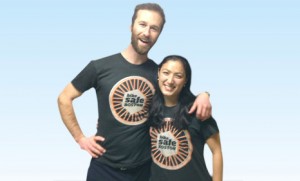
Meet Josh Zisson. Two weeks ago, Zisson was a Boston-based lawyer, quietly making Massachusetts a safer place for bikers. While he’s still a Boston-based lawyer with a passion for bike safety, his venture has blown up internationally.
How? One Fast Company article.
Zisson is behind the Bike Safe Boston blog and, more importantly, the creator of the Bicyclist’s Accident Report, which are convenient, wallet-size cards that help cyclists take down vital information after an accident, such as driver’s information, witness reports and exact location of the accident. The card also features six graphic squares, or the Bicyclist’s Bill of Rights, each outlining an important bike law in Massachusetts. The free cards were already popular in local bike stores throughout Massachusetts, with Zisson distributing over 3,000 in one month.
Then, Fast Company came calling and the demand for the report cards skyrocketed. From California to London, cyclists across the globe wanted a card for their back pocket. On January 4, the day the article was published, Zisson received 200 emails requesting cards – and even more poured in the next day. Since then, the post has garnered 816 tweets, 26 comments and 26 Facebook likes.
“I thought things were crazy when the Grist article came out [in December], but this is 10 times that,” Zisson tells BostInno.“The power and possibility of the Internet never ceases to amaze me,” he writes in his blog.
Why have the cards gone viral? “I think that something like this doesn’t really exist on a large scale,” says Zisson. “It’s a simple thing that people just don’t have in their areas. It just makes so much sense that it appeals to people immediately. Plus, it’s free.”
Which is exactly what’s putting Zisson in a bind: the free cards are expensive to print, and Zisson paid out of pocket for the Massachusetts cards. But because he’s passionate about bringing bike safety to the masses, Zisson has developed a model: if someone wants the cards in another state, they need to find someone to pay for the printing costs, and he will have that version designed. Thus far, he has received 10 pledges to print the cards, including New Jersey, California, Connecticut, Oregon, Nevada, Ohio and Rhode Island.
Of course, the out-of-state versions require an immense amount of research on Zisson’s part to determine the laws of each state, as well as new illustrations reflecting those laws for the backs of the cards. Because he’s only licensed to practice law in the state of Massachusetts, he would also like the cards to refer cyclists to qualified bike lawyers in their areas and has begun establishing that network.
“I want people to be able to go to a lawyer who actually rides a bike and knows what they’re doing and cares about bike advocacy and bike laws,” he says.

Last week, Zisson traveled to San Francisco to talk with bike shop owners and advocacy groups to mobilize bike safety awareness in large biking cities. Next up are New York City and Portland, OR, and ultimately, Zisson hopes to have a website like Bike Safe Boston running in every state that has a card, and vice versa. He also hopes to have a comparison of laws in other states, so that riders can educate themselves as to what their laws could be and rally for better legislation in their areas.
At the end of the day, Zisson remains dedicated to Boston-area bikers. He is currently selling reflective t-shirts in which 100 percent of the proceeds go to support local transit advocacy groups like the LivableStreets Alliance, MassBike and the Boston Cyclists’ Union. He’s also working with local designers to inspire safer biking technology.
Could he see this new-found fame turning into a business? “I’m not really a businessman. I’m a lawyer,” laughs Zisson. “But it sort of already has.”

